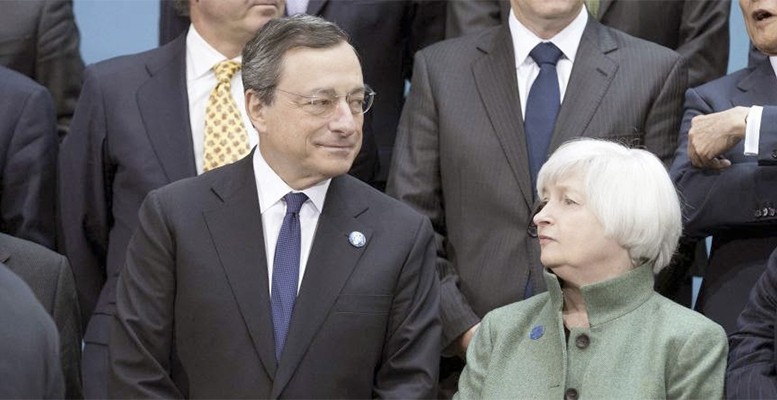In Jackson Hole, the FED and ECB Chairs have voiced concern about US plans to unravel the Dodd-Frank financial regulation act, and so undermine overall stability.
Janet Yellen recalled that loose financial scrutiny coupled with expansionary policies led to the 2008 financial crisis. Its spillover effects fuelled a devastating economic recession. Salvaging credit institutions from complete ruin proved a costly and painful exercise.
Fending off similar threats prompted a thorough review of rules governing solvency. The buffers for facing external shocks and contagion were sharply increased. Axing such sensible achievements would be tantamount to a suicidal drive towards total instability.
For his part, Mario Draghi sternly warned against making a backwards move in this area. He stressed that only tougher rules had prevented the current loose monetary conditions from feeding unrest in the financial markets. Lifting these safeguards would unleash uncontrolled bubbles and reckless investment policies.
He also launched a fierce attack on protectionism, depicting it as the main risk to economic recovery. With the key driving force for enhanced productivity in the advanced countries resting on free trade, any curb on market openness would result in a severe backlash and undermine growth prospects.
The Trump administration and Republican congressmen are likely to ignore such warnings. Heavy lobbying from credit institutions has played a pivotal role in the current plans to water down the tight rules of the Dodd-Frank Act, introduced to rein in solvency. So be it, but dire consequences might be the result of such an unwarranted move.
Their managers seem keener on earning bonuses than preserving financial stability. Little do they care, since it will be taxpayers and shareholders who will likely bear the losses caused by their reckless behaviour. This hugely asymmetric burden share is as an open invitation to irresponsible risk exposure.
Mr Trump will also ignore the pledges for open trade, while fully preserving fair terms. His obsessive attempt at increasing US prosperity by begging its neighbours seems a childish remake of the policies leading to the Great Depression. Trimming down the current 0.8 trillion dollars export flow from Canada, or the 0.5 trillion from Mexico, or the 0.3 trillion from China, will fail to deliver more jobs in the US. It will only impoverish trade partners and the domestic economy alike.
The Federal Reserve should act before the threats to financial stability materialise. The sharp asset price increase coupled with the prospect of looser banking rules may trigger the urgent need to make a disruptive crash landing, sooner than expected.
Stiffening credit conditions in time is the only sensible way to prevent the worst from happening. Ms Yellen’s heritage would undoubtedly benefit if she were to move swiftly before stepping down as FED Chair in February 2018.





